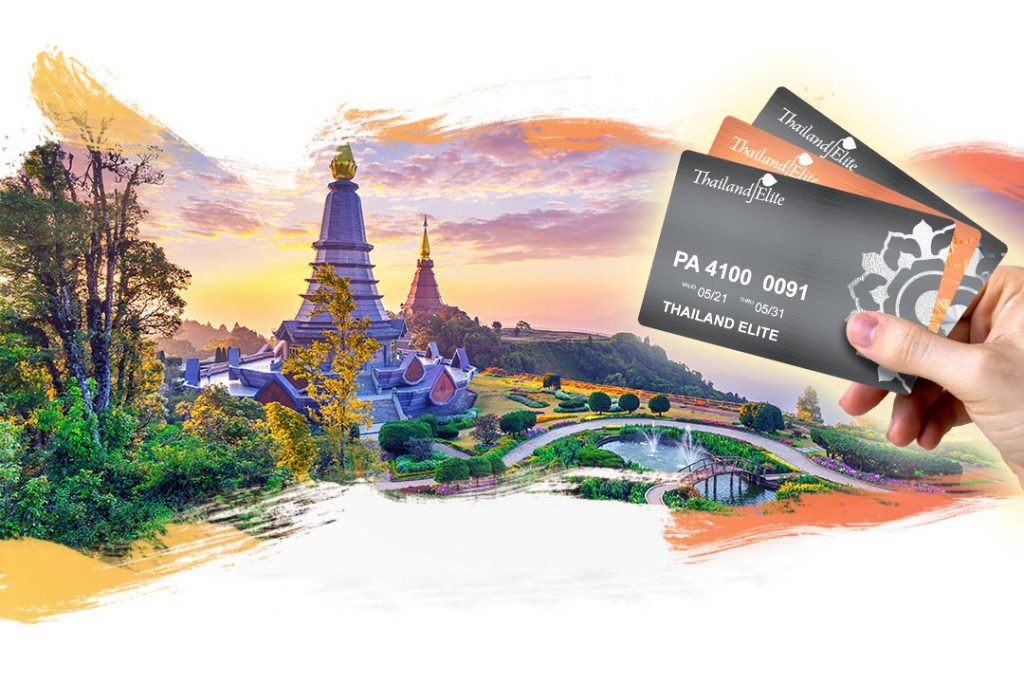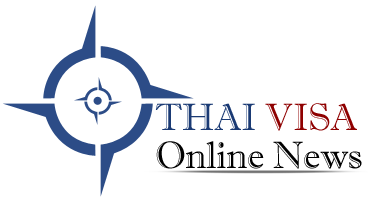Home

About Thai Visa News
Created in 2011, ThaiVisa News provides immigration information, immigration news, and travel guide and updates for people wishing to visit Thailand. The gateway to detailed information and requirements about Thai Visa application, whether researching travel opportunities, seeking information on travel restrictions, or looking for advice and assistance on how to move into Thailand. The comprehensive information of this website means that all answers to your immigration questions are at your fingertips.
Latest News


An Elite Personal Assistant in gold uniform greets a Thailand Privilege Visa member at the airport.
Imagine breezing through Thai immigration with VIP service and knowing you can stay in Thailand long-term without hassle.
The Thailand Privilege Visa – formerly known as the Thailand Elite Visa – offers exactly that kind of convenience. It’s a special long-term visa program, managed by a government-owned company, that lets foreigners live in Thailand for up to 5, 10, 15, or even 20 years with a host of exclusive perks. Designed for those seeking a hassle-free extended stay, this program is especially appealing to digital nomads, retirees, frequent business travelers, high-net-worth individuals (HNWIs), and families looking to relocate. In exchange for a one-time membership fee, Thailand Privilege Visa members enjoy not only residency rights but also VIP benefits—from airport fast-track to concierge services – making their stay in Thailand convenient and comfortable.
In this comprehensive guide, we’ll explain what the Thailand Privilege Visa is, its benefits, membership costs, how to apply, required documents, and the key limitations/conditions to know. Whether you’re a remote worker tired of visa runs or a family dreaming of a new home in Thailand, read on to see how this program can make long-term stay in the Land of Smiles a reality.
What is a Thailand Privilege Visa?
The Thailand Privilege Visa (Thailand Elite Visa) is a long-stay multiple-entry visa program that essentially operates as a membership club for long-term residency in Thailand. It’s administered by the Thailand Privilege Card Co. Ltd. (a state enterprise under the Tourism Authority of Thailand), ensuring government backing and legitimacy. Unlike typical visas that have strict qualifications, the Privilege Visa is open to most foreign nationals who can pay the membership fee and pass a background check – there are no minimum income, age, or education requirements (even minors can apply with parental consent). In essence, you’re paying for an extended tourist visa (Privilege Entry Visa) that comes with VIP treatment.
Who is it for? This program caters to a wide range of people seeking a secure, long-term stay in Thailand without bureaucratic headaches:
- Digital Nomads: Remote professionals who want a stable base in Thailand without doing border runs every few months. The Privilege Visa lets you reside uninterrupted and focus on work and travel.
- Retirees: Individuals looking to enjoy their retirement in Thailand’s warm climate and rich culture, without navigating complex visa rules or health insurance mandates. Unlike a retirement visa, the Elite visa doesn’t require annual renewals or proof of income/insurance.
- Investors and Business Travelers: Businesspeople and frequent travelers who need the flexibility to fly in and out of Thailand often. The Privilege Visa’s multi-year, multiple-entry permission is ideal for avoiding constant visa applications and offers time-saving perks like airport fast-track immigration.
- High-Net-Worth Individuals: Affluent entrepreneurs or investors who value comfort and status. The top-tier memberships come with exclusive services (luxury transportation, private events, concierge assistance) that cater to a luxury lifestyle.
- Families: Those who wish to relocate with spouse and children to Thailand, taking advantage of the country’s affordability and good infrastructure. Family members can be included under certain Privilege Visa packages, allowing the whole family to stay long-term under the program (e.g. parents and kids each get their own membership or added under a core member’s package with appropriate fees, and proof of relationship documents).
In short, the Thailand Privilege Visa is a premium long-term visa aimed at providing a smooth, VIP experience for living in Thailand. Members are granted 5-year renewable visas (up to 20 years total) and a bundle of perks that make life in Thailand easier – from help with immigration paperwork to leisure benefits. It’s one of the most straightforward pathways to semi-residency in Thailand for foreigners who don’t want to deal with the red tape of traditional visa categories.
Benefits for the Thailand Privilege Visa Holders
One of the biggest draws of the Thailand Privilege Visa program is the array of benefits that come with membership. Beyond the right to stay long-term, you gain access to VIP services that save you time, offer convenience, and add a touch of luxury to your Thailand experience. Below are some of the key benefits enjoyed by Privilege Visa holders:
- Long-Term, Multiple-Entry Visa: Enjoy a 5-year multi-entry visa, extendable up to 20 years in total. Each entry allows a 1-year stay, meaning you can live continuously in Thailand without the frequent border runs or visa renewals that plague other visa types. (This is a game-changer for remote workers and retirees who want stability – no more doing a visa run every 60 or 90 days!)
- No 90-Day "Visa Runs": While Thai law requires foreigners to report their address every 90 days, Privilege Visa members do not have to leave the country at short intervals as tourists do. You can stay uninterrupted and simply do the routine 90-day reporting to immigration (which the Elite staff can even assist with, as noted below).
- VIP Airport Services: Experience airport luxury and bypass the crowds. On arrival and departure, an Elite Personal Assistant greets you and escorts you through expedited immigration and customs lines. You get access to exclusive fast-track lanes, avoiding the long queues. Members can also relax in premium airport lounges and enjoy a round-trip limousine airport transfer to your hotel or residence. (Frequent business travelers love this – it can reduce arrival processing to under 30 minutes instead of hours.)
- Elite Personal Liaison & Government Concierge: The program provides personal assistance for navigating Thai bureaucracy. Dressed in gold uniform, your Elite Personal Liaison can handle the 90-day immigration reports on your behalf, so you don’t have to personally visit immigration each time. They also act as a government concierge, helping set up appointments or expedite processes with various Thai government agencies. This support is invaluable if you need to, for example, get a driver’s license or deal with any official paperwork in Thailand.
- Exclusive Leisure and Lifestyle Perks: Privilege Visa members are treated to a range of hospitality and lifestyle benefits. Depending on your membership tier, you can enjoy complimentary or discounted services such as spa treatments, golf course access, wellness packages, and even annual health check-ups at partner hospitals. Members also get special shopping privileges, VIP movie tickets, and access to world-class events. In short, your membership doubles as a VIP club card in Thailand, unlocking a more luxurious day-to-day life.
- Free Domestic Travel & Special Experiences: Higher-tier members receive extra privileges. For instance, Diamond and Reserve members get free domestic flights within Thailand via a partner airline, as well as invitations to exclusive experiences (Reserve members even get perks like private yacht trips, supercar test drives, or birthday river cruises as part of their package). Many packages also include a number of free hotel nights at luxury hotel chains each year for vacations in Thailand.
- Financial and Investment Facilitation: Unlike some visas, the Privilege Visa actively helps you integrate financially. As a member, you can open a Thai bank account with ease – simply show your Elite membership card and letter, and any local bank will let you open an account. You are also allowed to purchase property (condominiums), buy vehicles, and obtain a Thai driver’s license, and even invest in the Thai stock market if you wish. The program provides wealth management advisory services and exclusive networking events for members interested in investing in Thailand. (While you still must follow Thai laws for any investments, having the visa and the program’s support makes things much smoother for investor-minded expats.)
- No Mandatory Health Insurance: For older expats, a big benefit is that health insurance is optional for Privilege Visa holders. Other visa types (like retirement visas) require extensive health insurance coverage, but the Elite program does not require you to carry Thai health insurance. Of course, having health coverage is wise, but it’s not a legal requirement for this visa.
- 24/7 Multilingual Member Support: All members have access to round-the-clock customer service for any needs or emergencies. The support center can assist in multiple languages (English, Chinese, Japanese, etc.), ensuring nothing gets lost in translation. Whether you have a question about benefits or need help booking a service, help is just a call or email away, any time of day.
These benefits make the Thailand Privilege Visa much more than just a long visa – it’s a luxury expat membership. From the moment you land in Thailand to your everyday living and even future investments, the program is designed to give you peace of mind and VIP convenience. This is why it’s so popular among those who can afford it, and why many choose it over other visa options despite the cost.
Thailand Privilege Visa Membership Cost
To join the Thailand Privilege Visa program, you must purchase a membership package. There are several tiers of membership, each with different validity periods, perks, and price points. The one-time fee can range from around THB 650,000 (≈$19k USD) for the basic package up to THB 5 million (≈$148k USD) for the most exclusive package
No annual fees are required – you pay once and your membership (and visa) is valid for its duration. Below is an overview of the available membership levels as of 2025:
Bronze Membership – 5-Year Visa
(THB 650,000 ≈ $19,250 USD)
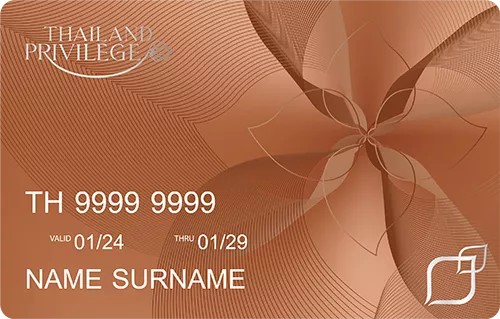
- This is a 5-year multiple-entry visa package that covers the essential VIP benefits (airport services, immigration assistance, premium lane access, etc.).
- Privilege Points: None (Bronze members do not receive annual points).
- The Bronze tier is a limited-time offering aimed at affordability – new applications for Bronze are only accepted until June 30, 2025. (It was introduced due to high demand from people seeking a lower-cost option.) After that date, Bronze may be discontinued for new applicants.
Gold Membership – 5-Year Visa
(THB 900,000 ≈ $26,600 USD)
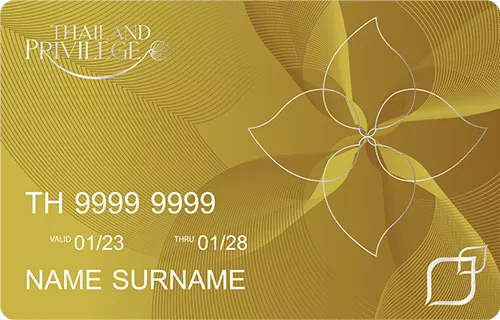
- Gold includes all the standard Elite privileges that Bronze offers (VIP airport service, etc.)
- Grants 20 Privilege Points per year to the member. These points can be redeemed for additional services (we’ll explain Privilege Points shortly).
- Gold is essentially an upgraded 5-year option for those who want a few more perks each year in exchange for a higher fee.
Platinum Membership – 10-Year Visa
(THB 1,500,000 ≈ $44,400 USD)
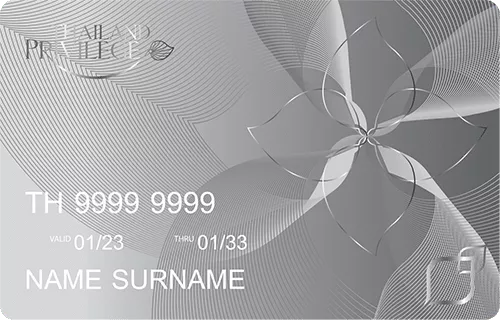
- This package provides a 10-year visa (initial 5-year visa stamp, with a renewal for another 5 years included).
- Platinum members get 35 Privilege Points per year to spend.
- This tier is popular with those planning a decade in Thailand or families, as it offers a longer stay and more perks.
- You can add immediate family members (spouse, children) under your Platinum membership for an additional fee of THB 1,000,000 per person, and they will enjoy the same 10-year visa validity.
- Each additional member gets their own card and annual points; proof of relationship is required when applying for family add-ons.
Diamond Membership – 15-Year Visa
(THB 2,500,000 ≈ $74,000 USD)
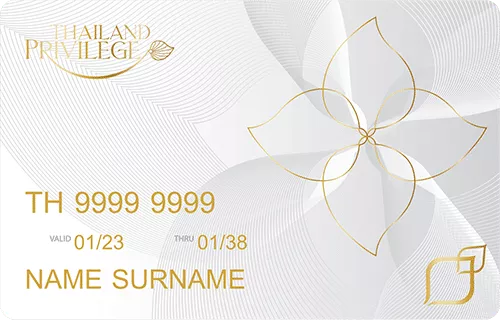
- This is a 15-year visa package.
- Diamond members receive 55 Privilege Points per year
- Unlock some exclusive benefits beyond the lower tiers, e.g., complimentary domestic flights within Thailand (via Bangkok Airways) each year and special insurance packages tailored for members.
- Great option for high-net-worth individuals or long-term expatriates who want a decade and a half of worry-free stay.
- Additional family can be added for THB 1,500,000 per person under the Diamond membership
Reserve Membership – 20-Year Visa (Invitation Only)
(THB 5,000,000 ≈ $148,000 USD)
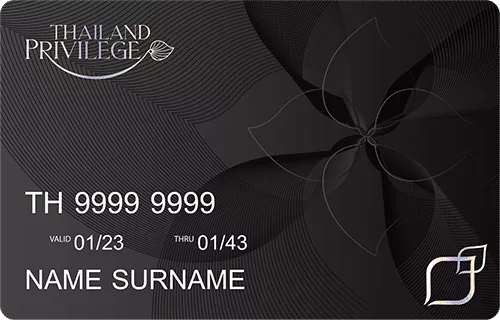
- This is the most elite 20-year visa package, available by invitation only and capped at only 100 new members per year
- Reserve members get 120 Privilege Points annually – a huge amount – to redeem for luxury services.
- The Reserve tier includes ultra-premium perks:
- members gain access to the exclusive "Reserve Club,"
- enjoy unlimited free domestic flights,
- get VIP concierge on a dedicated hotline,
- invitations to private events (like supercar test drives or luxury cruises on your birthday) and more.
- This membership is transferable (unlike other tiers) and can be considered a prestige status symbol in itself.
- It’s geared toward ultra high-net-worth individuals who want the absolute top-level service and are willing to invest significantly for a 20-year Thai residency with first-class benefits.
Thailand Privilege Points
You’ll notice that from Gold level upward, each membership grants annual Thailand Privilege Points. These points function like a rewards currency that you can redeem for various services to enhance your experience. For example, just 1 point can get you an airport limousine transfer or a spa treatment, while a few more points could cover a golf outing or a health checkup. With 3+ points, Diamond and Reserve members can even redeem a round-trip domestic flight. This system allows members to customize their perks each year based on their interests – whether that’s extra leisure activities, travel conveniences, or wellness services. Points reset each year (not accumulated), so members are encouraged to use them annually to make the most of their membership. Essentially, the higher your tier, the more “freebies” you can enjoy via point redemption.
Important Cost Notes: Aside from the membership fee, there is typically a THB 50,000 application fee when joining. However, as of early 2025 the government has waived this application fee to encourage new applicants. This waiver may be temporary, but it means right now you save 50,000 Baht in upfront costs. Another thing to remember is that all fees are one-time – there are no annual maintenance fees or renewals payments required during the validity of your membership. If you choose to upgrade to a higher tier later, you would pay the difference in price (upgrade options are available for some tiers). Also, the membership fee is not refundable if you decide to cancel, so choose a package that suits your long-term plans (more on this in the Limitations section). Finally, keep in mind that each person must have their own membership. There isn’t a single “family membership” covering everyone; instead, family members join either at a discounted rate under the main member’s package (for Platinum and above) or by purchasing separate memberships (for Bronze/Gold or if not eligible to be added under one account).
How to apply for a Thailand Privilege Card?
Applying for the Thailand Privilege Card is a straightforward process, especially compared to most visa applications. The program’s administrators and their GSSA agents will handle the heavy lifting (like coordinating with Thai immigration and conducting background checks), so you won’t need to visit embassies repeatedly or deal with too much paperwork yourself. Here are the basic steps to obtain a Thailand Privilege Card membership and visa:
- Submit Your Application: You can apply for the Privilege Visa from anywhere in the world – you do not have to be in Thailand to start. The first step is to fill out an application form and submit a copy of your passport (photo page) to an accredited Thailand Privilege Visa agent. The application can usually be done online or via email through official channels or authorized agencies. Along with the form and passport scan, you’ll provide a high-quality ID photo and any initial documents required (see next section for document list). Once received, the Thailand Privilege Card company, in conjunction with the Ministry of Foreign Affairs and Immigration Bureau, will perform a comprehensive background check on your profile. This due diligence ensures you have no criminal record, no immigration blacklists, and no history of overstaying in Thailand. Timeline: The background check and initial approval process typically takes 4–6 weeks, as it involves clearance from multiple Thai government agencies. You’ll be notified if you pass this stage.
- Payment & Membership Acceptance: After your application is approved, you will receive an acceptance notification. At this stage, you need to pay the membership fee for your chosen package (e.g., 650,000 Baht for Bronze, 1.5 million for Platinum, etc.). Payment is usually made via bank transfer or international wire to the Thailand Privilege Card company. (Some authorized Elite Visa agents even accept payment in cryptocurrencies now, to accommodate global clients.) Once payment is received, you’ll get a Welcome Letter and Elite Membership Number (EMN) issued by Thailand Privilege Card Co.. You are now officially a member. The welcome packet will include instructions on how to actually get the visa stamp in your passport. You’ll also receive details about your membership card (the physical Thailand Privilege Card) which you will use to access services and privileges.
- Visa Issuance (Affix the Visa to Passport): After membership is confirmed, you have options for obtaining the visa stamp (the Privilege Entry Visa) in your passport. If you are outside Thailand, you can go to your nearest Thai Embassy/Consulate with the provided approval documents to get the visa sticker affixed in your passport. Alternatively, you can choose to get the visa on arrival when you first fly into Thailand after membership – at Bangkok Suvarnabhumi Airport or Phuket Airport, the immigration officials can issue your Privilege Visa entry stamp on the spot (you would coordinate this in advance with your Elite personal liaison). If you are already in Thailand on another visa, you don’t even need to leave – your Elite Visa agent can arrange with the Immigration Bureau in Bangkok to convert your status and stamp the Privilege Visa in your passport there. After you receive the visa in your passport, you’re all set to start enjoying the benefits!
How long does the whole process take? From the time you submit all required documents, the processing time is generally 30 to 45 days (roughly 1 to 1.5 months) for the visa to be ready. In some cases it can be a bit longer if background checks are delayed. It’s recommended to apply at least 2 months before you intend to travel to Thailand to ensure everything is ready. The good news is the process is largely handled by the Privilege Card staff and agents – you won’t have to attend visa interviews or anything strenuous. Many applicants report a smooth experience: after sending in documents and payment, their visa was waiting for them at the airport when they arrived (as one testimonial noted, it was issued upon arrival in Phuket, hassle-free).
Tips: It can be very helpful to work with an official Elite Visa sales agent or legal advisor throughout this process. Agencies like the one affiliated with Thailand Privilege Visas (Hawryluk Legal Advisors, etc.) can guide you, ensure your paperwork is correct, and communicate with the Privilege Card company on your behalf. Their expertise can speed up approval and help with any special circumstances. The cost to you is the same, and you get added support – including in dealing with things like transferring to a different visa later or any issues that arise. Given the significant investment, having professional assistance is wise and the consultation is often free.
Finally, once you have your Privilege Visa, remember to activate your privileges: schedule your first airport pickup if needed, contact your Elite personal liaison for any initial services, and familiarize yourself with how to use your points. The agency will usually brief you on this. With your visa in hand and membership active, you’re ready to enjoy a long, worry-free stay in Thailand!
Required Documents for Thailand Privilege Visa
One attractive aspect of the Thailand Privilege Visa application is that the documentation requirements are relatively light compared to other visa types. You mainly need to prove your identity and, if applicable, your family relationships. There’s no need to show bank statements, income proof, or health insurance for this visa (since your membership fee is the qualifier). Generally, prepare the following documents when applying:
- Passport – A copy of your passport bio-data page (the page with your photo and personal details). Your passport should have at least 6 months of validity remaining, though in practice you’d want more since you’ll be staying long-term. If your passport will expire soon, renew it before applying.
- ID Photo / Scan of ID – A passport-sized photo (or digital high-resolution photo) is usually required for the application form. The guidelines sometimes mention a "scanned copy of any valid ID", which essentially covers the same need – a clear photo identification of you. Providing a standard passport photo (recent, color, with white background) is recommended.
- Completed Application Form – Fill out the official Thailand Privilege Visa application form with your personal details, contact information, etc. Your agent will provide this form (it can be done electronically). Make sure all information is accurate and matches your passport.
- Personal Data Consent Form – As part of the process, you’ll sign a consent form allowing the company to process your personal data and perform background checks. They have a Personal Data Policy Form that you must duly fill and sign (your agent will give you this; it’s basically compliance with data privacy laws).
- Proof of Relationship (for Family Applications) – If you are applying with family members (or adding family later), you need to show proof of relationships. For a spouse, this means a marriage certificate. For children, birth certificates or adoption papers are required. The documents should ideally be translated into English or Thai and notarized if not originally in one of those languages. These prove that the spouse/child is the immediate family of the primary member (sometimes called the "Core Member"). Example: If a husband is the main applicant and the wife and kids will join under his Elite membership, the marriage certificate and the children’s birth certificates must be provided with the application.
Those are the standard documents. In most cases, no police clearance certificate or medical certificate is required from you – the background check is handled internally with Thai authorities. However, additional documents may be requested depending on your situation. For instance, if you have a history of staying in Thailand on certain visa types, they might ask for more info. A recent update noted that applicants who previously held an Education Visa in Thailand need to provide some extra documents (like the school’s license) to ensure the ED visa is legitimate. Such cases are relatively rare, and your agent will advise you if anything special is needed.
Note on Eligibility: While documents are few, you still must meet basic eligibility criteria. Essentially, you should hold a foreign (non-Thai) passport, have no serious criminal record or past deportations, and have no history of overstaying your visa in Thailand. These are checked during the background process. There is no minimum age requirement to join the program – applicants can be children or seniors alike, as long as they pay the fee. If an applicant is under 20 years old (a minor), a parental consent letter will be needed alongside their application to authorize them to join. Many families use the Elite Visa to get long-term visas for their children; in such cases, ensure birth certificates and parental consent forms are in order.
In summary, gather your passport, fill out the forms, prepare a nice photo, and any family certificates if relevant. Compared to other visas that require financial records or health insurance, the Privilege Visa’s document list is refreshingly simple. Your representative will double-check all paperwork before submission to make sure everything is complete.
Thailand Privilege Limitations and Restrictions
While the Thailand Privilege Visa is a fantastic option for many, it’s important to understand its limitations and conditions. This is a long-term tourist visa with perks, but it does not confer the same rights as, say, a work visa or permanent residency. Here are the key restrictions and conditions you should be aware of:
- No Working Allowed in Thailand: Privilege Visa holders are prohibited from working in Thailand or applying for a Thai work permit. This visa is for residency, not employment. You can run an overseas business remotely or manage your investments, but you cannot take up employment with a Thai company or salary in Thailand while on this visa. If you do wish to work in Thailand in the future, you would have to cancel/suspend your Elite visa and obtain a proper Non-Immigrant B visa and Work Permit. (In short: digital nomads working online for foreign companies are fine, but you can’t legally take a local job.)
- Not a Permanent Residence Permit: Being an Elite member does not make you a permanent resident or citizen of Thailand. The Privilege Visa is classified as a long-term tourist visa (Privilege Entry Visa), so it does not count as "permanent residency" status. Even after 10 or 20 years, you remain a long-term visitor. (Thailand does have a separate Permanent Residency process and a Citizenship process, but the Elite time doesn’t automatically qualify you for those, though years on this visa may count toward residency application eligibility in some cases.) Essentially, the Privilege Visa is a renewable long visa, not a step toward a Thai passport.
- Membership Fee is Non-Refundable: All Privilege Visa memberships come with a strict no-refund policy. If you cancel your membership or decide not to use it, you won’t get your money back. This is important to consider before joining – make sure you are committed to living in/thoroughly using Thailand for the duration. There are no partial refunds either; once the visa is issued and membership activated, the money is sunk cost.
- Membership is (Generally) Non-Transferable: You cannot transfer or sell your Thailand Privilege membership to someone else. It’s personal to you and, aside from adding family under certain packages, only you benefit from it. The one exception is the Reserve Membership (20-year tier), which has a clause allowing transfer, presumably subject to approval and perhaps only to immediate heirs or similar. But for the other tiers (Bronze, Gold, Platinum, Diamond), you cannot change the named holder. (If, for example, you decide to leave Thailand and you have 10 years left on your Elite visa, you can’t hand it over to a friend or sell the remaining years – it simply would go unused, or you formally cancel it.)
- No Current Work Permit Holders: Interestingly, the program rules state that if you currently hold a Thai Work Permit, you are not eligible to apply for the Elite Visa. This means it’s aimed at those who are not already working in Thailand. If you have a job in Thailand, you presumably already have a visa, so the Elite membership is off-limits unless you give up your work permit. This is just a point to note for anyone who might think of switching – you’d have to stop work and cancel the work permit to join the Privilege program.
- Nationality Restrictions: The Privilege Visa program is open to almost all nationalities, with only a very narrow restriction. As of the latest update, applications from all countries are accepted except North Korea. In the past, a few nationalities faced extra scrutiny or were barred, but Thailand has expanded eligibility in 2024/2025 to be inclusive, given the program’s popularity. So unless you hold North Korean citizenship (or possibly certain other flagged nationalities), you can apply without issue. Of course, all applicants still undergo security screening.
- Obey Thai Laws (Don’t Overstay or Misuse): While this applies to any visa, it’s worth reiterating: you must abide by Thai laws and visa rules during your stay. This means no overstaying your visa beyond the permitted duration, even with Elite status. Fortunately, Elite visa holders get one-year entries, so just ensure you renew the entry stamp (by stepping out and back in, or visiting immigration for an extension) before a year is up each time. Also, refrain from any activities that could get you deported (drug laws, etc.), as that would also terminate your membership without a refund. The background check is thorough, and even after approval, serious legal troubles can jeopardize your status.
- 90-Day Reporting Requirement: Having the Privilege Visa doesn’t exempt you from Thailand’s standard 90-day reporting rule for foreigners staying long-term. Every 90 days of continuous stay, you must report your current address to immigration. The good news is this visa makes it easy – the Elite Personal Liaison service will handle the paperwork and even offer home pickup service for 90-day reports under certain membership plans. So while you must comply, it’s hardly a burden; just inform your concierge and they’ll take care of it. Failure to report can result in fines, so utilize the help provided.
- No Tax Benefits: The Privilege Visa does not come with any tax breaks or fiscal benefits by itself. If you earn income within Thailand, you are subject to the normal Thai tax laws – you’ll need to pay Thai income tax on Thai-sourced income like any resident would. The visa doesn’t turn you into a tourist for tax purposes if you’re essentially living in Thailand. However, if your income is from overseas (as is the case for many digital nomads and retirees), Thailand currently has frameworks that may exempt foreign-sourced income if not remitted in the same year, etc. Consult a tax advisor for your specific situation. Just be aware: the Elite visa’s perks are immigration and lifestyle-related; it’s not a legal tax residency shield. Plan your finances accordingly.
In summary, treat the Privilege Visa as a luxury long-stay visa, not an immigration visa with settlement rights. You can enjoy living in Thailand for up to 5–20 years with minimal hassle, but you can’t work locally and you don’t gain immigrant status. If your goal is to eventually work or immigrate permanently to Thailand, you might use the Elite visa as a stopgap or convenience while pursuing other visas or residency pathways. Many people are perfectly content using the Elite visa for the freedom it provides – just keep the above limitations in mind to avoid any misunderstandings.
Before joining, consider your long-term plans: if you foresee needing to work in Thailand, or if you’re not sure you’ll stay for the long haul, weigh the cost vs benefits. But for thousands of expats, remote professionals, and retirees, the Thailand Privilege Visa strikes an ideal balance – an easy, comfortable life in Thailand in exchange for an upfront fee. With the information in this guide, you can now decide if this exclusive visa program aligns with your needs and make an informed application if so. Enjoy your Thai Elite experience and make the most of the incredible benefits while living in the Land of Smiles!


The Destination Thailand Visa (DTV Visa) is one of the easiest options for living and working in Thailand long-term in 2025. With recent updates and clarified application processes, the DTV Visa has become a popular choice for remote workers, digital nomads, and frequent visitors looking for a simple way to stay in Thailand for extended periods.
These changes and new guidelines make it easier than ever to apply for the Destination Thailand Visa. In this blog, we’ll take a look at the latest updates to the DTV Visa and all the important new information that’s come out, as well as how you can apply.
What is the DTV Visa?
The DTV Visa, often referred to as Thailand’s digital nomad visa, is a multiple-entry visa valid for up to five years. It allows you to stay in Thailand for up to 180 consecutive days per visit, making it one of the easiest and most cost-effective ways to stay in Thailand long-term. This visa comes with several advantages for remote workers and frequent visitors, including:
- Freedom to travel in and out of Thailand without needing a re-entry permit.
- Option to acquire DTV visas for your spouse and dependent children.
- A straightforward application process with minimal eligibility requirements compared to most Thai visas.
- Lower cost compared to other long-term visas, priced at just 10,000 baht.
- An option to extend your 180-day stay for an additional 180 days per entry, for a fee of 1,900 baht, enabling year-long uninterrupted stays.
Note: As a type of tourist visa, the DTV restricts working for Thai companies and applying for permanent residency in Thailand.
What Are the Updates to the DTV Visa in 2025?
The Thai government has clarified some of its guidelines on how to qualify for the DTV and introduced significant updates to enable more applicants a chance to get their visa. Here’s a closer look at the key updates to the DTV program.
Which Thai Soft-Power Activities Qualify for the DTV?
One of the ways to qualify for the DTV is to enroll in so-called “Soft Power Activities.” These included cultural programs like Muay Thai lessons and Thai cooking courses, but there was very little guidance on which activities qualified.
After hearing reports from Siam Legal’s many DTV clients, we have gotten a better idea of the standards the Thai government has for eligible Soft Power Activities. To qualify, your involvement in an approved activity must last at least six months, as any application based on a program with a shorter duration will likely be denied.
Language schools, however, are excluded from these criteria completely and enrollment in such a school is not a valid DTV Soft Power Activity.
More Ways to Apply for Your DTV Visa Application
As of January 1st 2025, the Thai E-Visa system is now utilized by every Royal Thai Consulate and Embassy worldwide. This system allows you to apply for Thai visas online from any country with a Thai embassy, including the DTV. In fact, some embassies will now require E-Visa applications and are no longer taking in-person appointments.
With this expansion, you can apply for a DTV from the comfort of your home or hotel without needing to make an appointment at the embassy or stand in line.
Additionally, visa agents in Thailand can assist you remotely by connecting directly to the E-Visa system, making it easy to get professional assistance from any country with a Thai Embassy.
However, if you’re applying from a country other than your home country, new reports suggest that you may need to provide documents proving your residency there. Each embassy has a different policy, so call ahead to see if you are able to apply there.
After assisting a large number of clients with applying for their DTVs, we have found that the best countries near Thailand to apply as non-residents are Cambodia and Vietnam.
How to Apply for a DTV Visa in 2025
The DTV Visa application process in 2025 is now much easier than before, allowing you to apply remotely from anywhere with the expanded Thai E-Visa system.
To begin, make sure you meet the qualifications. You must be at least 20 years old, have no history of long visa overstays with Thai Immigration, and have at least 500,000 THB in liquid funds. Depending on where you apply from, this amount may be higher, as all embassies have different requirements.
Once qualified, collect all required documents, including
- Your passport
- Passport-sized photograph
- Proof of financial assets
- Specific documents for your visa category:
- If you're applying as a remote worker or digital nomad, you’ll need an employment contract or professional portfolio.
- For Soft Power Activities, an acceptance letter is required.
- Dependents need proof of their relation to the primary DTV holder such as birth and marriage certificates.
Acquire high-quality digital scans or photos of these documents in addition to paper copies.
With your documents ready, submit your application and upload your documents through the Thai E-Visa system. Once your documents are ready, you’ll need to submit your application through the Thai E-Visa system and upload the necessary files.
After submission, your application will be reviewed by the relevant Thai authorities. This process typically can take a matter of days or weeks in extreme cases. During this time you may receive requests for additional information if your documentation was not satisfactory.
Once your application is approved, you’ll receive an electronic confirmation. Depending on your location, you may need to visit a Thai Embassy or Consulate to finalize the process and have the visa stamped in your passport. After that, you’re all set to start your journey to Thailand with your DTV Visa in hand.
Contact Siam Legal for DTV Assistance
If you’re considering the Destination Thailand Visa, 2025 is the best time to apply. With clearer policies and an easier application process, the DTV Visa has become a great choice for remote workers and frequent travelers alike.
If you want a smooth application experience with minimal complications and delays, Siam Legal is here to help. As a visa agency with 20+ years of experience, we are able to provide expert consulting and support that ensures you get your DTV swiftly and successfully. Instead of wasting time preparing your application and risking rejection and disruption to your plans, partner with Siam Legal and leave the red tape to us. Start your DTV Visa application today and make 2025 the year you finally secure a smooth and easy stay in the Land of Smiles. Contact Siam Legal for professional assistance and start your next adventure with ease.


Are you considering long-term stays in Thailand? The Thailand Privilege Card Co., Ltd. (TPC) has unveiled an exciting new opportunity in November 2024 - the Thailand Privilege Bronze membership. This groundbreaking addition to their Elite Visa program offers an accessible entry point to premium long-stay privileges in the Land of Smiles.
What Makes the Thailand Privilege Bronze Membership Special?
The Bronze tier represents a strategic move to bridge the gap between standard visa options and premium Elite Visa memberships. Priced at 650,000 THB (approximately 19,000 USD), it positions itself as the most cost-effective way to access the prestigious Thailand Elite Visa program while maintaining essential VIP benefits.
Key Features of Bronze Membership:
- 5-Year Validity: Enjoy extended stays in Thailand with a multiple-entry visa valid for half a decade
- 90-day Report Assistance: Personal assistance for 90-day report service
- Streamlined Immigration Experience: Access to Premium Lanes and exclusive Elite lounges at airports
- Professional Support Services: Comprehensive assistance for various administrative needs in Thailand
Comprehensive Benefits Package
While Bronze membership doesn't include the Privilege Points system available in higher tiers, it delivers an impressive array of benefits designed to enhance your Thai experience:
Airport Services
- Exclusive access to Premium Lanes for swift immigration clearance
- Unlimited Elite Personal Assistant (EPA) support at international airports
- Access to premium airport lounges
Administrative Support
- One complimentary Elite Personal Liaison service for official tasks
- Assistance with bank account opening featuring special privileges
- Unlimited 90-day reporting assistance at TPC's Sathorn headquarters
- 24/7 access to the Member Contact Center (MCC) for comprehensive support
Lifestyle Benefits
- Exclusive discounts at premier restaurants and shopping centers
- Special rates at participating hospitals and wellness centers
- Privileged access to airline services and car rental options
- Members-only networking events and seminars
- Access to exclusive co-working spaces
- Professional wealth advisory and investment consulting services
Important Eligibility Criteria
Unlike traditional Thai visas, the Bronze membership maintains minimal eligibility requirements:
Who Can Apply:
- Open to all nationalities (except North Korea)
- No minimum income requirements
- No educational prerequisites
- No age restrictions
- No investment obligations
Basic Requirements:
- Clean immigration record (no serious visa overstays)
- No criminal convictions
- No history of bankruptcy
- No record of mental unfitness
- Never held a Thai volunteer visa
- Passport validity of at least one year
Limited Time Opportunity
This exceptional offer comes with a time constraint - applications will only be accepted from December 15th, 2024, to June 30th, 2025. While TPC may consider making this tier permanent, there's no guarantee of its availability beyond the initial offering period.
Work Considerations
While the Bronze membership, like all Thailand Elite Visas, doesn't permit employment with Thai companies, it poses no restrictions on:
- Remote work for foreign employers
- International business operations
- Digital nomad activities
- Freelance work for overseas clients
Thailand Privilege Bronze Membership Application Process
To ensure a smooth application process, prospective members must:
- Contact an authorized General Sales and Services Agent (GSSA)
- Receive a free consultation about the program
- Submit required documentation through the GSSA
- Await background check clearance
- Complete the membership payment
- Receive Elite Visa approval
Working with a GSSA is not only mandatory but also beneficial, as their services are included in the membership fee and they provide valuable expertise throughout the application process.
Making the Right Choice
The Thailand Privilege Bronze membership represents an excellent opportunity for those seeking:
- Long-term stay options in Thailand
- Premium travel experiences
- Hassle-free visa management
- Access to exclusive services and benefits
- Cost-effective entry into the Thailand Elite Visa program
Whether you're a digital nomad, retiree, or frequent visitor to Thailand, the Bronze membership offers a balanced combination of essential benefits and premium services at a more accessible price point than other Elite Visa options.
For those interested in this limited-time opportunity, consulting with an authorized GSSA is the recommended first step to secure your place in this exclusive program.


LTR Visa Thailand: Benefits and Privileges is a strategic immigration and residency program launched by Thailand in 2022 through a Cabinet Resolution, not under the usual framework of the Immigration Act B.E. 2522 (1979). It is a cross-sectoral initiative managed primarily by the Thailand Board of Investment (BOI) in collaboration with the Immigration Bureau and Revenue Department.
Designed to align foreign residency with Thailand’s long-term economic, demographic, and innovation goals, the LTR Visa is a legally structured visa class that provides 10 years of residency, potential employment rights through a digital work permit, tax incentives, streamlined compliance, and access to investment and property opportunities under clearly defined eligibility categories.
II. Legal and Administrative Foundation
A. Legal Sources and Mechanisms
- Cabinet Resolution (2022): Authorizes creation of the LTR Visa class, bypassing standard visa structures under the Immigration Act.
- BOI Internal Regulations: Define procedural requirements, digital work permit access, and sectoral eligibility.
- Ministerial Guidance (MOF, MOI, MOL): Addresses the coordination between BOI, Immigration Bureau, and Revenue Department.
- Revenue Code of Thailand: Governs the taxation privileges associated with certain LTR categories.
B. Coordinating Agencies
| Agency | Role |
|---|---|
| Thailand BOI | Application screening, issuing digital work permits, sector vetting |
| Immigration Bureau | Visa issuance, stay monitoring, address reporting |
| Revenue Department | Income tax assessment, exemptions, and enforcement |
| One Stop Service Center (OSSVC) | Central hub for submission, renewals, and family-related processing |
III. Visa Term, Type, and Core Features
| Feature | LTR Visa Provision |
|---|---|
| Duration | 10 years (issued as 5+5) |
| Entry and Exit | Multiple-entry, no re-entry permit required |
| Address Reporting | Once per year (instead of every 90 days) |
| Health Insurance | Required: USD 50,000 or Thai social security enrolment |
| Employment Rights | Optional; BOI-issued digital work permit for eligible categories |
| Renewability | Handled via OSSVC, contingent on continued eligibility |
IV. Eligibility Categories and Strategic Alignment
Each of the four LTR Visa categories is tied to Thailand’s broader economic and labor market development goals.
1. Wealthy Global Citizens
- Annual Income: ≥ USD 80,000 (past 2 years)
- Net Assets: ≥ USD 1 million
- Thai Investments: ≥ USD 500,000 (real estate, equity, or bonds)
Objective: Stimulate capital inflow and broaden private sector financial participation.
2. Wealthy Pensioners
- Age: ≥ 50 years
- Annual Income: ≥ USD 80,000 or ≥ USD 40,000 + USD 250,000 invested in Thai property/bonds
Objective: Drive sustainable consumption in health, wellness, and real estate sectors through foreign retirees.
3. Work-from-Thailand Professionals
- Employer: Foreign firm with ≥ USD 150 million global revenue
- Annual Income: ≥ USD 80,000
- Work Model: Fully remote (outside of Thai labor market)
- Experience: ≥ 5 years
Objective: Monetize global remote labor flows without labor market disruption.
4. Highly Skilled Professionals
- Annual Income: ≥ USD 80,000 or ≥ USD 40,000 with postgraduate qualification
- Sector: BOI-prioritized (e.g., robotics, digital, biotech, aviation)
- Employer: Thai BOI-certified entity or public institution
Objective: Inject technical expertise into Thailand’s innovation economy and reduce dependency on skill importation.
V. Employment Rights: BOI Digital Work Permit
LTR Visa holders in Categories 3 and 4 are eligible for a digital work permit, distinct from the standard Ministry of Labour process.
Legal Features
- Exempt from Thai-to-foreigner ratio (4:1) under Labour Protection Act
- Validity: 5 years, in sync with visa
- Format: Digital only (paperless)
- Employer Scope: Must be BOI-certified or public sector entity
This permit provides structured, sector-specific legal access to the Thai labor market without conventional restrictions.
VI. Taxation: Structural Privileges under Thai Revenue Law
LTR Visa holders benefit from codified tax incentives—some conditional, others categorical.
1. Flat 17% Personal Income Tax
- Eligibility: Category 4 (Highly Skilled Professionals)
- Condition: Must be employed by a BOI-endorsed company
- Scope: Thai-sourced employment income only
Statutorily reduces the PIT burden from 35% maximum to 17%, supporting talent retention.
2. Exemption for Foreign-Sourced Income
- Legal Basis: Section 41 of the Revenue Code
- Rule: Foreign-sourced income is not taxable unless remitted into Thailand in the same calendar year
Applies broadly to pensions, remote work income, dividends, and royalties held abroad.
3. Tax Residency and Filing Requirements
- Triggered at ≥183 days of physical presence in a calendar year
- Income tax return filing is mandatory if resident—even if income is exempt due to non-remittance
VII. Real Estate and Investment Participation
While Thai law prohibits foreigners from owning freehold land, LTR Visa holders may participate in other property and capital sectors.
Permitted Rights
- Condominium Ownership: Freehold within the 49% foreign ownership quota
- Leasehold: Residential land and houses for up to 30 years (renewable)
- Investment Access: Thai government bonds, public equities, BOI-approved startups and funds
Prohibited Rights
- Land ownership: Still barred under Section 86 of the Land Code; LTR provides no exemption
VIII. Dependent Inclusion and Family Privileges
LTR Visa applicants may sponsor up to four dependents, defined as:
| Dependent Type | Privileges |
|---|---|
| Legally married spouse | 10-year visa; separate digital work permit possible (if qualified) |
| Children under 20 years | Included on 10-year visa; eligible for enrollment in Thai or international schools |
All dependents are processed as part of a unified application file under OSSVC, minimizing procedural fragmentation.
IX. Immigration and Administrative Advantages
- Fast-track immigration lanes at major international airports
- Elimination of re-entry permits, unlike most long-stay visas
- Centralized processing and renewal at OSSVC
- Assistance with Thai Tax ID, Social Security registration, and work permit matters
X. Compliance, Monitoring, and Revocation
Ongoing Requirements
- Maintain qualifying income or employment
- Hold active insurance or Social Security coverage
- Submit annual address report
- File tax return if tax-resident
Revocation Grounds
- Submission of false information
- Criminal conviction or deportable offenses
- Breach of visa category (e.g., working outside approved scope)
- Failure to maintain eligibility threshold (income, job, or investment)
Revocation is administrative but subject to appeal under the Administrative Procedure Act B.E. 2539 (1996)
XI. Legal Use Cases
1. American Remote Marketing Executive
- Category: Work-from-Thailand Professional
- Employer: U.S. firm
- Income: USD 120,000
- Taxation: Not liable in Thailand if income is held abroad
- Outcome: 10-year visa, no Thai labor exposure
2. German Retiree
- Category: Wealthy Pensioner
- Assets: USD 300,000 Thai condo
- Income: EUR 70,000 pension
- Outcome: 10-year visa, no O-A visa deposit restrictions
3. Japanese Robotics Engineer
- Category: Highly Skilled Professional
- Employer: BOI-certified firm
- Income: THB 4.5 million/year
- Tax Rate: 17% flat
- Family: Spouse and child included in the same visa
XII. Conclusion
The LTR Visa Thailand is more than an immigration tool—it is a comprehensive residency, employment, and tax framework anchored in law and structured around national development strategy. Unlike traditional visas, its privileges are not discretionary or lifestyle-based; they are legal entitlements granted to foreign nationals who meet economic, demographic, or professional benchmarks.
By offering long-term security, fiscal efficiency, and regulated labor access, the LTR Visa represents the most advanced foreign residency instrument currently available in Thailand.

The 5-Year Retirement Visa, also known as the Non-Immigrant “O-X” Visa, allows retirees to stay in Thailand for an extended period without frequent renewals. This visa is available to foreigners aged 50 or older from selected countries, including Japan, Australia, the U.S., and many European nations. It offers significant benefits, such as multiple entries and a longer visa duration than the typical one-year retirement visa.
1. Eligibility Criteria
To qualify for the 5-Year Retirement Visa, applicants must meet specific criteria:
a) Age and Nationality
Applicants must be 50 years old or older at the time of application. The visa is only available to citizens of 14 approved countries, including Japan, Canada, Australia, the U.S., and most EU countries.
b) Financial Requirements
Applicants must demonstrate financial stability by meeting one of the following criteria:
- A minimum deposit of THB 3 million in a Thai bank account for at least one year before applying.
- An annual income of at least THB 1.2 million. Alternatively, a combination of savings and income that meets these thresholds is also acceptable.
c) Health Insurance
Visa holders must have health insurance with minimum coverage of THB 40,000 for outpatient care and THB 400,000 for inpatient care.
d) Good Conduct
Applicants must provide a criminal background check from their home country and must not have any criminal record that could jeopardize public security in Thailand.
2. Application Process
The application for a 5-Year Retirement Visa involves several steps:
a) Initial Application
Applications are submitted at a Thai embassy or consulate in the applicant’s home country or at an immigration office in Thailand. Key documents required include:
- Passport valid for at least 10 years.
- Proof of financial requirements (bank statements, income proof).
- Medical certificate indicating the applicant is free from certain diseases.
- Health insurance documentation.
- Police clearance certificate.
b) Approval
Once approved, the visa is initially issued for five years. Visa holders must report to Thai immigration every 90 days to confirm their current address. The visa can be extended for an additional five years, provided the requirements continue to be met.
3. Financial Obligations
Visa holders must maintain the financial thresholds required for the visa:
- The THB 3 million in savings must remain in the Thai bank account for the first year. After the first year, THB 1.5 million must be maintained for the remaining visa period.
- Alternatively, if using income for qualification, the visa holder must provide annual proof of income that meets the required threshold.
4. Benefits of the 5-Year Retirement Visa
The 5-Year Retirement Visa offers several advantages for long-term retirees:
- Multiple Entries: Visa holders can leave and re-enter Thailand without needing to apply for a re-entry permit.
- Extended Stay: The visa is valid for five years, reducing the need for annual visa renewals.
- Health Insurance: Since it’s mandatory for this visa, retirees have built-in health insurance coverage.
5. Reporting and Renewal Requirements
- 90-Day Reporting: Visa holders must report their address to immigration every 90 days.
- Visa Renewal: After the initial five-year period, the visa can be extended for another five years if the financial, health, and good conduct conditions are met.
- Re-Entry: Leaving and re-entering Thailand within the validity period does not affect the visa status, but address reporting after re-entry is required.
Conclusion
The 5-Year Retirement Visa is a great option for retirees seeking long-term residency in Thailand without the hassle of annual renewals. With benefits such as multiple entries and long-term stability, it provides an attractive solution for retirees from approved countries, provided they meet the stringent financial and health requirements. By offering an extended stay with fewer renewals, Thailand continues to position itself as a retirement destination for international retirees seeking both comfort and stability.

90-Day Reporting. For foreign nationals staying in Thailand on a long-term visa, 90-day reporting is a critical legal requirement. This process ensures that the Thai immigration authorities are updated on a foreigner's current location every 90 days. Failing to comply can result in fines and potential complications with visa renewals or re-entry permits. This article provides an in-depth look at the 90-day reporting process, including who must report, the various reporting methods, and key considerations for compliance.
1. Who Must Do 90-Day Reporting?
Foreign nationals who hold any type of long-term visa (such as a Non-Immigrant Visa, Business Visa, Retirement Visa, or Marriage Visa) and have been staying in Thailand for more than 90 consecutive days are required to file a 90-day report. It’s important to note that the 90-day reporting requirement applies regardless of whether a foreigner has left Thailand and re-entered the country.
a) Exemptions
Tourists on short-term visas or individuals staying less than 90 days do not need to file a report. Additionally, if you leave Thailand before the 90-day period expires and return, the counting resets, and the reporting must be done 90 days after re-entry.
2. Methods of Filing 90-Day Reports
There are several ways to file your 90-day report, allowing flexibility for those who may be traveling or not able to visit an immigration office in person:
a) In-Person Reporting
The most traditional method is visiting the local immigration office where your residence is registered. This requires presenting your passport, departure card (TM6), and a completed TM47 form. Make sure to visit the correct office based on your location, as this can vary across Thailand’s provinces.
b) Online Reporting
The online reporting system allows foreign nationals to submit their 90-day report through the Thai Immigration Bureau website. Online reports must be submitted 7 to 15 days before the reporting deadline. While this method is convenient, the system can be prone to technical issues, and not all foreigners have success with online submissions.
c) Reporting by Mail
Mail reporting is another option, but it must be completed 7 to 15 days before the due date. You must send the completed TM47 form, copies of your passport information page, visa page, latest entry stamp, and departure card (TM6) along with a self-addressed, stamped envelope to the relevant immigration office.
d) Reporting Through a Representative
If you are unable to visit the immigration office in person, a representative can file the report on your behalf. The representative needs to have a copy of your passport and signed power of attorney.
3. What Happens If You Miss the Reporting Deadline?
If you fail to file your 90-day report on time, there are penalties involved:
- Fines: A late submission incurs a fine of THB 2,000. If you are caught without having reported, the fine may increase to THB 5,000.
- Re-entry Permits and Visa Extensions: Non-compliance can also complicate visa renewals or re-entry permit applications. Keeping up with your 90-day reports is essential to maintain good standing with Thai immigration.
4. Extensions of Stay and New 90-Day Periods
When you extend your stay (such as renewing your visa or applying for a visa extension), the 90-day reporting timeline restarts. For example, if you receive an extension on a retirement visa or a business visa, your next report will be due 90 days after the date of approval.
a) Re-entry After Leaving Thailand
If you leave Thailand during your stay and re-enter, the 90-day counting period resets, and you must file a new report 90 days after your re-entry date.
5. Practical Considerations for 90-Day Reporting
a) Holiday and Weekend Considerations
If your 90-day reporting date falls on a public holiday or weekend, you should file the report on the next working day without penalty. However, it’s best to plan ahead to avoid unnecessary delays, especially during high-traffic periods at immigration offices.
b) Residence Address Changes
If you move to a new residence during your stay in Thailand, you must inform immigration authorities by filing a TM30 form within 24 hours. Once the TM30 is submitted, your new residence will be the address you provide for future 90-day reports.
c) Record Keeping
Keep copies of all 90-day reports and documentation, as immigration officials may request them during visa extensions or other interactions with immigration authorities.
Conclusion
The 90-day reporting requirement in Thailand is a critical responsibility for long-term foreign residents. While the process may seem cumbersome, especially for new expatriates, Thailand’s immigration system provides multiple methods for compliance, including online, mail, and in-person submissions. Understanding the requirements, staying on top of deadlines, and maintaining proper documentation ensures a smooth and compliant stay in Thailand, avoiding fines or legal complications. Working with immigration services or legal professionals may also help streamline the process for newcomers or those unfamiliar with Thai regulations.
Thai Elite Visa
Thailand Elite visa is a special visa aimed for high networth businessmen, digital nomads, retirees, investors, high income individuals, and families looking to move in to Thailand. The Elite member or card holder has special privileges such as VIP treatment at the airport, exclusive spa and golf courses, special discount at major department stores and shopping malls, elite personal assistance, and many more. To learn more if Thailand Elite Visa is the most suitable long term visa for you, just click the link below.
